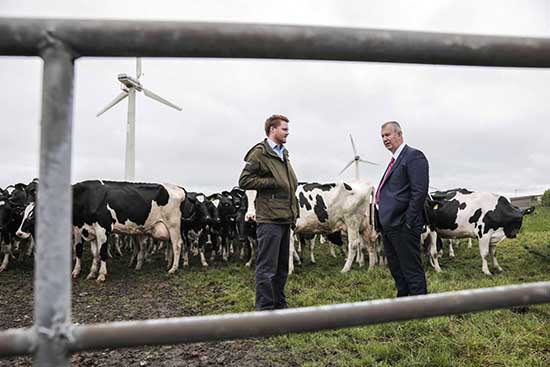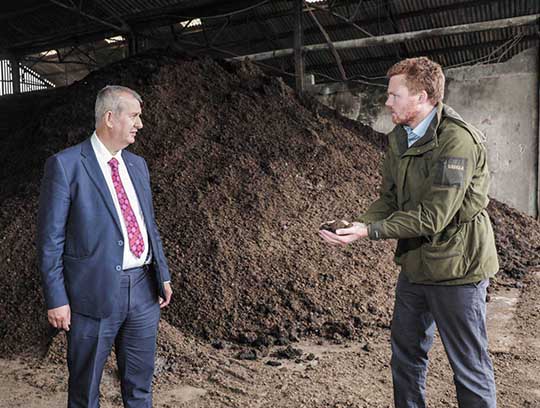Poots plans ‘Green Growth’ approach for Northern Ireland.
Developing and defending our natural assets is key to creating a resilient economy and a healthy environment and should be at the heart of future Government policies and business strategies, Environment Minister Edwin Poots has said.
Minister Poots made the comments after speaking in the Assembly today, where he announced an ambitious and bold roadmap for a ‘Green Growth’ recovery from Covid-19.
Following the statement, the Minister visited Blakiston Houston Farm in Belfast to see ‘Green Growth’ in practice on a working dairy farm through the use of renewable energy and sustainability initiatives.
Speaking during the visit, the Minister said: “All types of businesses and organisations can help protect our environment and are already doing so by utilising ‘Green Growth’ initiatives.

“Today I’ve seen at first-hand how a working dairy farm has swapped fossil fuels for cleaner renewable initiatives, such as rain water harvesting, wind turbine, anaerobic digestor, rejuvenated woodland to capture carbon and adapting new slurry separation techniques.
“These initiatives have reduced the farm’s reliance on fossil fuel produced energy, the need to purchase fertilisers and reduced their running costs, all of which has helped boost business productivity and profitability while also benefiting the environment.”
Speaking about his ambitious plans for a Green Growth recovery from Covid-19, the Minister added: “Covid-19 has caused us all to think differently and behave differently. There are fewer cars on the road, people are enjoying our outdoors more and finding innovative ways of working that result in benefits for our environment.
“Our economy will change substantially over the next 30 years, largely driven by technological advances and the UK Government’s commitment to achieve Net Zero Carbon by 2050. This will mean big changes in how Government and businesses operate.
“Right now, we are presented with an exceptional opportunity – to make real and long-lasting linkages between the private sector, the public sector and the people, to help us achieve a total generational shift in how we approach our economy and our environment. We must not just defend our environment, we must develop it to maximise the benefits it presents.

“If we do this well, we create jobs, reduce carbon, enhance profitability, lower waste, increase efficiency and protect our environment and climate for future generations. What’s more, many of the solutions needed are simple, available and require only modest innovation, investment and attention.
“Solutions such as boosting our broadband capabilities, enhancing our infrastructure network, using cleaner energy and planting more trees – something I’ve already committed to though my Forests for our Future initiative, which aims to plant 18 million trees by 2030. In fact, many of the solutions can be found by simply rolling out good practice, recycling more or reducing energy consumption for example.
“To achieve a rapid green growth, I have today set out my roadmap to achieving a healthy environment and a healthy bottom line for our economy. This roadmap includes a co-designed Green Growth Strategy, a framework of policies to achieve its objectives, and the establishment of an inter-ministerial group to help weave Green Growth throughout all future Government policies.
I intend to consult across the entire waste, agriculture, energy, environment, public and private sectors to get as well-rounded a view as possible.”
The Minister said: “Many businesses are already thinking green – they are already doing the right thing and reaping the benefits. What they need from us now is support, a clear focus and an achievable roadmap to help them do more. That is what the plan I’ve presented today does.”
Speaking during the Minister’s visit to his farm, Jack Blakiston Houston, Director of BH Estates said: “We are very aware of our role as custodians of the countryside and put a lot of energy and resources into environmental projects.”
Nick Whelan, Group CEO of Dale Farm, also attended the visit as this producer supplies Dale Farm, who have already committed to sustainable business approaches through the Prosperity Agreement they entered into with DAERA last year.
Speaking at the new dairy unit, Nick commented: “Sustainability presents both challenges and opportunities to the dairy industry and, as a major cooperative, it is Dale Farm’s responsibility to manage these in the best interests of our farmer members and society overall.
“We will continue to work with Minister Poots and his team within DAERA to explore how best to address both sustainability and the many issues currently facing the dairy industry.”
Useful Notes.
- The aim of ‘Green Growth’ is to ensure the sustainability of Northern Ireland’s natural environment into the heart of future Executive policies while fostering the necessary conditions for innovation, investment and competition that can give rise to new sources of economic growth, while building resilient ecosystems.
- DAERA will take a collaborative approach to develop a multi-decade ‘Green Growth’ strategy and delivery framework, expected to be launched early next Spring. The delivery framework will consist of a range of programmes which together contribute to the targets and outcomes. Some, like ‘Forests for our Future’ are already in motion and other foundation programmes will be established in tandem with the strategy
- ‘Green Growth’ will give a focus on fostering the necessary conditions for innovation, investment and competition that can give rise to new sources of economic growth, while building resilient ecosystems. It should also take into account the broader social pillar of sustainable development and pay specific attention to social issues and equity concerns that could arise as a result of the greening of our economy
- Prosperity Agreements are voluntary agreements through which DAERA and an organisation can explore opportunities for reducing environmental impacts in ways that create prosperity and wellbeing.
- A Prosperity Agreement is about economic prosperity and is a tool for DAERA to help key partners see the environment as a way to achieve this, for more information, visit: https://www.daera-ni.gov.uk/articles/prosperity-agreements























